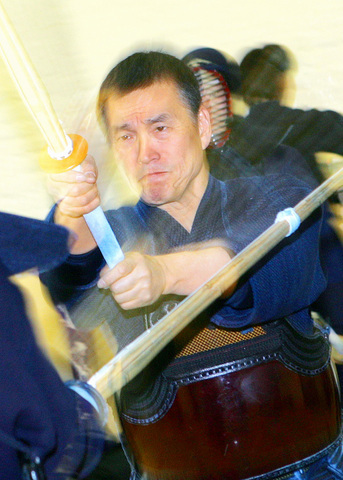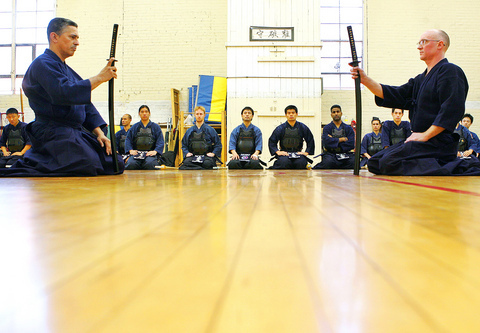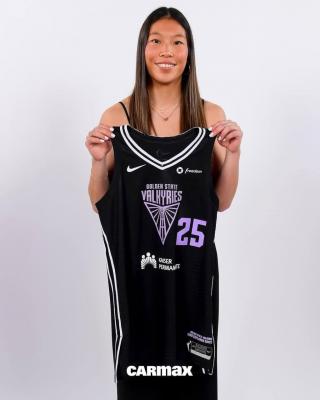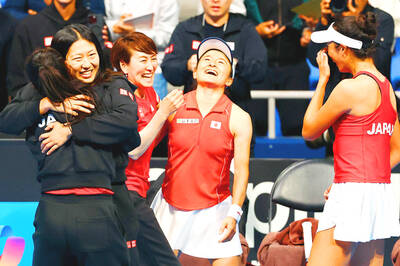"You're looking for the samurais?" said the girl sitting in the hallway. "They're up there."
She pointed up a staircase to a small gym on the top floor of Jan Hus Church on East 74th Street. Inside was a startlingly surreal scene, especially to someone stepping off the streets of the Upper East Side, where people were picking up dry cleaning and lounging at sidewalk cafes on a Saturday evening.
Up in the old church gym, the scene resembled a ferocious battle from The Seven Samurai. Some 50 people in Japanese warrior dress -- dark robes, heavy chest armor and helmets with fearsome face-cages -- hurled bloodcurdling screams as they beat one another over the head with poles.

PHOTO: NY TIMES
The gym's door, though closed, hardly stifled the screams or contained the thunderous stomping that rumbled the building itself. Even residents of neighboring high-rises have grown accustomed to the boisterous practices held three evenings a week by the New York City Kendo Club, a tight-knit group of urban samurais who have made this gym their home dojo for a quarter-century.
The club was founded in 1976 by Noboru Kataoka, a world-renowned kendo sensei. To honor its 30th anniversary, the club is holding a kendo tournament on Sunday at John Jay College of Criminal Justice on the West Side, where kendo practitioners from around the world will compete.
Kataoka's students tend to follow his teachings religiously. Whatever their profession -- sanitation men battle architects, lawyers fight film producers and teachers face off with editors -- they say the ancient principles of the samurai warrior help them cut through the complexities of the modern urban environment.

PHOTO: NY TIMES
There is the money manager who credits kendo with keeping him sharp when making crucial investment decisions. There is the architect who says kendo enables him to handle high-pressure projects and harrowing deadlines. There is the Brooklyn woman who sleeps with her kendo sword next to her bed for security.
"From the moment you set foot in this dojo, you are a New York samurai," said Jose Pena, 51, who has been studying with Kataoka three days a week for the past 27 years. "It may be 2006, but we still follow the way of the warrior."
Pena studies Japanese culture and travels regularly to Japan to take advancement tests in the kendo rankings known as dans. He is currently in the sixth dan and is already looking forward to returning in 2011 for the test to enter the seventh dan, the second-highest rank.
The money manager, Raymond Stewart, said he joined kendo 25 years ago to help him handle his stressful finance job on Wall Street.
"I manage more than US$200 million and have to make the right decision about what to do with it," he said. "Kendo teaches you to wait for the right moment and then strike with total conviction."
The club's members competing on Sunday are entered under smaller teams with names such as the Spare Ribs, the Wild Bunch and Cutie Honey.
One member of Cutie Honey is Kyung Kim, 33, a teacher from Queens who joined the club three years ago after seeing kendo only occasionally on Korean soap operas.
"I'm very sensitive emotionally, and I needed mental discipline in my life," she said at David Copperfield's pub, where the club gathers with Kataoka for drinks after class.
When Kataoka first came to New York from Japan, he began renting teaching space in various dance studios downtown, but found them too flimsy for kendo practice. Three broken wooden floors and one shattered wall mirror later, he found Jan Hus church. Its floor was strong, but its neighbors were unaccustomed to the screaming and commotion of kendo. Several times, police officers were called to the gym.
"They would come busting in the door, and then stop and look and say, `Oh, kendo,"' he said. Yelling is a crucial part of kendo, he explained, a sign that the stomach and chest muscles are joining in the power of the strike.
"This where the strength comes from," he said, holding his belly. "We yell to bring the power up from here. The more years you train, the better you can yell. It's like an opera singer."
At practice last week, each newcomer suited up methodically in dark robes. Each donned a chest plate and wrapped his head in a bandanna emblazoned with Japanese characters depicting various aspects of kendo. Then the helmet, its wire face mask menacing and its epaulet flaps flaring out like the Flying Nun's habit, to protect the shoulders.
Kendo is done in bare feet and the footwork is short, choppy and quick. Each student uses a bamboo-slatted staff known as a shinai. The students line up to spar with the senior members of the class. The players meet and cautiously cross the tips of their swords and begin parrying for the smallest of openings through which to strike. Then they rush at each other with a powerful gallop, holding their swords above their head with both hands and striking down.
Kataoka demonstrated how to push the opponent's sword, causing the opponent to push back and thus create an imbalance: an opening.
"If you don't have technique, all you have left is power, muscle," said Kataoka, 57, who teaches with grace and an economy of words and movement. He also gets occasional work as an actor under the name Ken Kensei, including a part in an upcoming film directed by Clint Eastwood, Red Sun, Black Sand.
His wife, Mami Kataoka, 42, was also at practice. She has been practicing kendo since age 11 and has reached the fourth dan. She had just flown in from Japan, and after weeks of separation, the spouses reunited not by embracing, but by exchanging blows to the head and shoulders.
After practice, Kataoka took out a steel sword and knelt down next to it, to demonstrate a 400-year-old art of drawing the sword, known as iaido. Kataoka is a 20th-generation master of the form, having studied it since childhood with a premier sensei in Japan.
His eyes almost closed, he went through a routine of highly stylized movements, repeatedly sheathing and unsheathing the sword. It whistled through air as it sliced through imaginary opponents in some ancient battle.
Then he put on his Angels jacket and walked out into the quiet night of East 74th Street.

College basketballer Kaitlyn Chen has become the first female player of Taiwanese descent to be drafted by a WNBA team, after the Golden State Valkyries selected her in the third and final round of the league’s draft on Monday. Chen, a point guard who played her first three seasons in college for Princeton University, transferred to the University of Connecticut (UConn) for her final season, which culminated in a national championship earlier this month. While at Princeton, Chen was named the Ivy League tournament’s most outstanding player three times from 2022 to last year. Prior to the draft, ESPN described Chen as

College basketballer Kaitlyn Chen (陳凱玲) has become the first player of Taiwanese descent to be drafted by a WNBA team, after being selected by the Golden State Valkyries in the third and final round of the league's draft yesterday. Chen, a point guard who played her first three seasons in college for Princeton University, transferred to the University of Connecticut (UConn) for her final season, which culminated in a national championship on April 6. While at Princeton, Chen was named the Ivy League tournament's most outstanding player three times from 2022 to last year. Prior to the draft, ESPN described Chen as a

Japan yesterday secured a second consecutive Billie Jean King Cup finals appearance with a 2-1 win over 2023 champions Canada, thanks to Ena Shibahara and Shuko Aoyama’s 6-3, 5-7, 6-2 win over Kayla Cross and Rebecca Marino in the qualifying doubles decider. Shibahara and Aoyama powered through the opening set 6-3, breaking twice for a quick 3-0 lead. Cross and Marino hit back in the second, edging it 7-5 to level the match, before the Japanese pair regained control in the third. Canada’s 18-year-old Victoria Mboko edged Shibahara 6-4, 6-7 (8/10), 7-5 in a marathon opening clash. Mboko fired eight aces to

DAY OF BLOWOUTS: Elsewhere, the Lakers clinched the third seed in the Western Conference with a 140-109 pounding of the under-strength Houston Rockets The Denver Nuggets on Friday improved their playoff position, with a triple double from Nikola Jokic helping them to a 117-109 win over the Memphis Grizzlies. The Serbian put up 26 points, 13 assists and 16 rebounds. The triple-double performance, his 34th this season, ensured that he will finish the regular season as just the third NBA player to average a triple double across an entire season. The win meant the Nuggets improved to 49-32 on the season and gave them a real chance of grabbing fourth place and home-court advantage in the playoffs. Aaron Gordon top scored with 33 points for Denver,